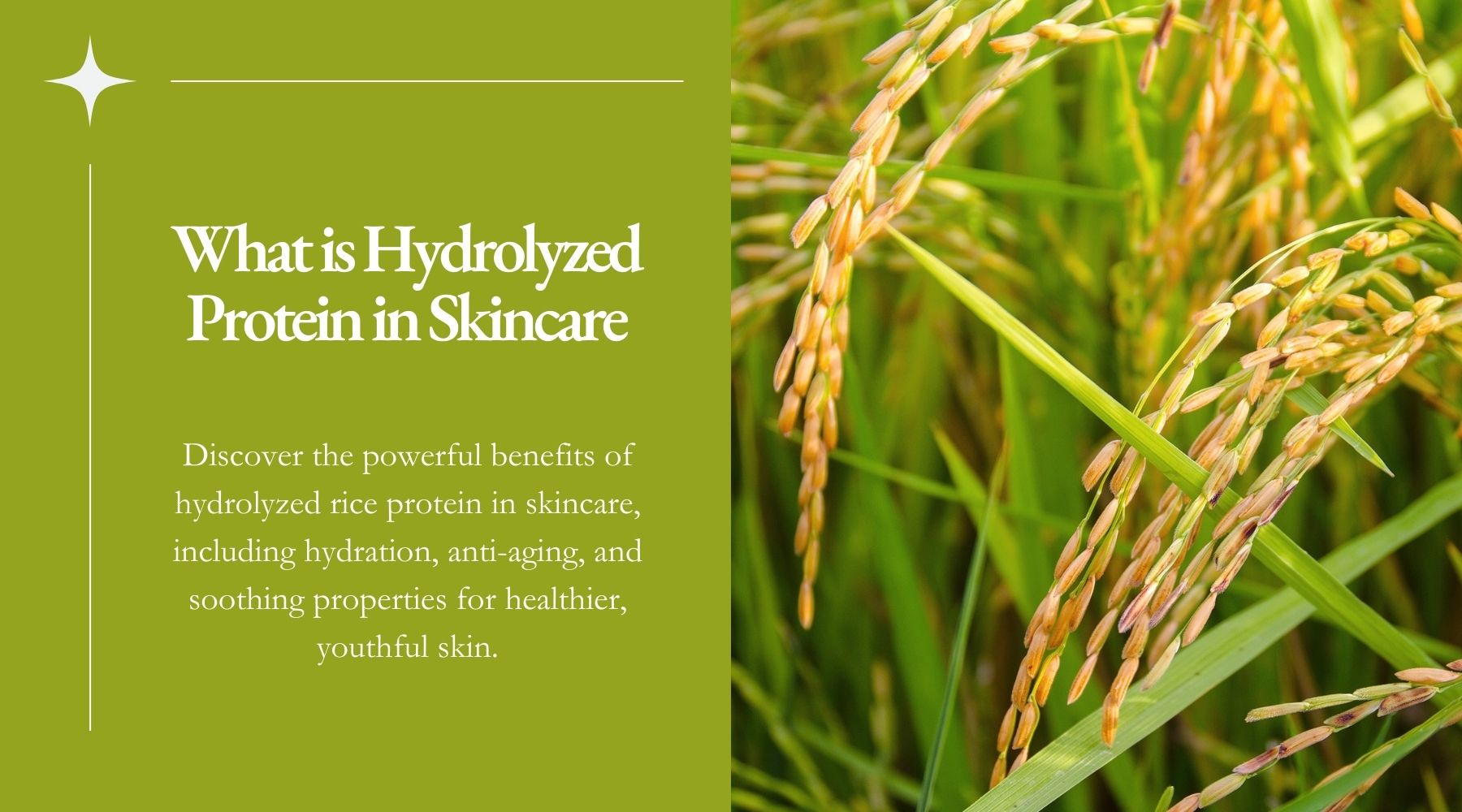
What is Hydrolyzed Rice Protein in Skincare?
Welcome to the World of Hydrolyzed Rice Protein
In the ever-evolving realm of skincare, new ingredients constantly emerge, promising transformative benefits. Inspired by the use of rice water, hydrolyzed rice protein was born and made to stands out, capturing attention for its multifaceted advantages.
This potent ingredient, derived from the humble rice grain, has found its way into a variety of skincare products, offering hydration, anti-aging properties, and much more.
Why Hydrolyzed Rice Protein is a Skincare Gamechanger
Hydrolyzed rice protein isn't just a fleeting trend. Its efficacy is backed by science, making it a gamechanger in skincare. By providing essential nutrients and enhancing the skin's natural functions, it helps achieve a healthier, more youthful complexion. This ingredient is particularly lauded for its versatility and compatibility with different skin types.

Understanding Hydrolyzed Rice Protein
What is Hydrolyzed Rice Protein?
Hydrolyzed rice protein is a water-soluble extract obtained from rice. This ingredient is created through hydrolysis, a process that breaks down the protein into smaller peptides and amino acids. This breakdown enhances its ability to penetrate the skin and deliver nourishing benefits effectively. It is the perfect combo to support healthy skin and contributes to supporting many parts of the skin barrier providing natural moisturizing factors to the skin as well as signaling peptides that support protein synthesis such as collagen and elastin.
The Science Behind Hydrolysis: Breaking Down Rice Protein
Hydrolysis involves using water to break down complex molecules into simpler ones. In the case of rice protein, enzymes or acids are used to cleave the protein into smaller peptides and amino acids. This process not only makes the protein more absorbable by the skin but also enhances its moisturizing and protective properties.
From Rice Bran to Skincare: The Extraction Process
The journey of hydrolyzed rice protein begins with rice bran, the outer layer of the rice grain. This bran is rich in proteins, vitamins, and minerals. Through hydrolysis, these components are extracted and transformed into a potent skincare ingredient. The resulting hydrolyzed protein is then incorporated into various skincare formulations. The nice part is the sustainable aspect! Indeed, the bran is a byproduct of rice production and hence instead of being trashed, is processed to extract all valuable elements.
Nutritional Composition
What is Rice Protein Made Of?
Rice protein is composed of a complex mix of amino acids, peptides, and proteins. It is particularly rich in essential amino acids such as lysine, methionine, and tryptophan. These components are crucial for maintaining skin health and promoting cellular repair.
Amino Acids: The Building Blocks of Hydrolyzed Rice Protein
Amino acids are the fundamental building blocks of proteins. In hydrolyzed rice protein, these amino acids play a critical role in maintaining the skin's barrier function, enhancing hydration, and supporting collagen production. They are essential for skin repair and regeneration.
Nutrient Profile: Vitamins and Minerals in Rice Protein
In addition to amino acids, rice protein contains a variety of vitamins and minerals. These include vitamin E and tocotrienols, which is known for their antioxidant properties, and B vitamins, which support cellular metabolism and skin renewal. Minerals such as magnesium and potassium also contribute to the overall health of the skin.
Benefits for the Skin
What Does Hydrolyzed Rice Protein Do for Skin?
Hydrolyzed rice protein offers a myriad of benefits for the skin. It acts as a moisturizer, anti-aging agent, and soothing ingredient, making it a versatile addition to any skincare routine. For more on skin science, read our article about simple skincare science.
Moisture Magnet: How Hydrolyzed Rice Protein Hydrates Skin
One of the primary benefits of hydrolyzed rice protein is its ability to attract and retain moisture. Its small peptides and amino acids penetrate the skin, enhancing its moisture-binding capacity. This results in a plump, hydrated complexion.
Elasticity and Firmness: Boosting Skin’s Structure
Hydrolyzed rice protein helps to boost the skin's elasticity and firmness. By supporting the skin’s natural collagen and elastin fibers, it helps to maintain a youthful, firm appearance. This is particularly beneficial for aging skin, which tends to lose its elasticity over time.
Anti-Aging Hero: Smoothing Fine Lines and Wrinkles
The peptides in hydrolyzed rice protein stimulate collagen production, which is essential for maintaining skin's structural integrity. This helps to smooth fine lines and wrinkles, providing a more youthful appearance.
Soothing Sensitivity: Calming and Protecting Irritated Skin
Hydrolyzed rice protein is also known for its soothing properties. It helps to calm irritated skin and reduce inflammation, making it ideal for sensitive skin types. Its protective barrier function helps to shield the skin from environmental stressors.
Mechanism of Action
How Hydrolyzed Rice Protein Penetrates the Skin
The small molecular size of hydrolyzed rice protein allows it to penetrate the skin's surface more effectively. This deep penetration ensures that the beneficial peptides and amino acids reach the lower layers of the skin, where they can exert their effects.
The Role of Amino Acids in Skin Health
Amino acids are crucial for maintaining skin health. They support the production of collagen and elastin, enhance the skin’s barrier function, and aid in the repair of damaged skin. In hydrolyzed rice protein, these amino acids are readily available for the skin to use. Read our article about the power of amino acids in skincare to learn more.
Film-Forming Properties: Long-Lasting Hydration
Hydrolyzed rice protein forms a thin, protective film on the skin's surface. This film helps to lock in moisture, providing long-lasting hydration. It also protects the skin from external aggressors, such as pollutants and harsh weather.
Safety and Suitability
Is Hydrolyzed Rice Protein Safe for All Skin Types?
Hydrolyzed rice protein is generally safe for all skin types, including sensitive and acne-prone skin. Its gentle nature makes it an excellent choice for those who experience irritation with other ingredients.
Ideal Skin Types and Conditions for Hydrolyzed Rice Protein
This ingredient is particularly beneficial for dry, sensitive, and aging skin. Its hydrating and soothing properties help to address common concerns such as dryness, irritation, and fine lines.
Incorporating Hydrolyzed Rice Protein in Your Routine
How to Choose the Right Products with Hydrolyzed Rice Protein
Look for products that list hydrolyzed rice protein high on the ingredient list. This indicates a higher concentration of the active ingredient, ensuring you receive its full benefits. Read more about simple skincare routines in our blog about mastering simple skincare without compromising on results.
Daily Skincare Routine: Where Hydrolyzed Rice Protein Fits In
Hydrolyzed rice protein can be incorporated into various steps of your skincare routine, from cleansers to moisturizers. Its versatility makes it easy to add to both your morning and evening regimen.
How to Maximize the Benefits of Hydrolyzed Rice Protein
To maximize the benefits of hydrolyzed rice protein, use it consistently and in conjunction with other complementary ingredients, such as antioxidants and vitamins. This combination can help enhance hydration and protect the skin from environmental damage.
Conclusion
Summarizing the Benefits of Hydrolyzed Rice Protein in Skincare
Hydrolyzed rice protein offers a host of benefits, from hydration and soothing to anti-aging. Its gentle yet effective nature makes it a valuable addition to any skincare routine.
Final Thoughts on Making the Switch to Hydrolyzed Rice Protein
Switching to products containing hydrolyzed rice protein can transform your skincare regimen, providing noticeable improvements in skin texture and health. And it is not just good for skin, it is also excellent for scalp and hair health.
With its proven benefits and gentle nature, hydrolyzed rice protein is worth incorporating into your skincare routine. Give it a try and experience the difference it can make for your skin.
Frequently Asked Questions
Question 1. Is Hydrolyzed Rice Protein Good for Skin?
Yes, hydrolyzed rice protein is excellent for skin, offering hydration, anti-aging benefits, and soothing properties.
Questions 2. Is Hydrolyzed Protein Worth It?
Hydrolyzed protein is worth it for those seeking effective and versatile skincare solutions. Its benefits are supported by scientific evidence and user testimonials.
Question 3. Is Rice Protein Good for Your Face?
Rice protein is beneficial for the face, providing essential nutrients and improving skin health and appearance.
Question 4. Is Rice Protein Anti-Inflammatory?
Yes, rice protein has anti-inflammatory properties, making it ideal for soothing irritated and sensitive skin
Learn More
Hydrolyzed rice protein offers incredible benefits for your skin by deeply hydrating, enhancing elasticity, and visibly smoothing fine lines and wrinkles. Its powerful amino acids and nutrients work wonders, making your skin look and feel rejuvenated. The entire Lancolia beauty line is infused with this remarkable ingredient, ensuring you achieve the best possible skincare results. Experience the transformative power of hydrolyzed rice protein with Lancolia and unveil your most radiant skin yet. Explore our best-sellers.
REFERENCES
Moisturizing and elastic properties of hydrolyzed rice protein - Journal of Cosmetic Dermatology
Research on the role of amino acids in skin health - National Institutes of Health (NIH)
Anti-aging benefits of peptides derived from hydrolyzed rice protein, including their effect on wrinkles and fine lines - PubMed
Study on the film-forming ability of hydrolyzed proteins and their role in providing long-lasting skin hydration - Springer Link
Share




